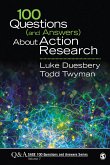- Broschiertes Buch
- Merkliste
- Auf die Merkliste
- Bewerten Bewerten
- Teilen
- Produkt teilen
- Produkterinnerung
- Produkterinnerung
This is an essential guide for graduate students and researchers in the social and behavioural sciences, identifying and answering the essential questions from assessing risks to protecting privacy and vulnerable populations. It is also a very useful resource for students developing their thesis and dissertation proposals.
Andere Kunden interessierten sich auch für
![100 Questions (and Answers) About Survey Research 100 Questions (and Answers) About Survey Research]() Erin Ruel100 Questions (and Answers) About Survey Research48,99 €
Erin Ruel100 Questions (and Answers) About Survey Research48,99 €![100 Questions (and Answers) About Research Methods 100 Questions (and Answers) About Research Methods]() Neil J. Salkind100 Questions (and Answers) About Research Methods48,99 €
Neil J. Salkind100 Questions (and Answers) About Research Methods48,99 €![100 Questions (and Answers) about Tests and Measurement 100 Questions (and Answers) about Tests and Measurement]() Bruce B. Frey100 Questions (and Answers) about Tests and Measurement56,99 €
Bruce B. Frey100 Questions (and Answers) about Tests and Measurement56,99 €![100 Questions (and Answers) about Action Research 100 Questions (and Answers) about Action Research]() Luke S. Duesbery100 Questions (and Answers) about Action Research48,99 €
Luke S. Duesbery100 Questions (and Answers) about Action Research48,99 €![Answers to Your Biggest Questions about Teaching Elementary Math Answers to Your Biggest Questions about Teaching Elementary Math]() John J. J. SanGiovanni (Howard Public School System)Answers to Your Biggest Questions about Teaching Elementary Math27,99 €
John J. J. SanGiovanni (Howard Public School System)Answers to Your Biggest Questions about Teaching Elementary Math27,99 €![Answers to Your Biggest Questions about Teaching Middle and High School Ela Answers to Your Biggest Questions about Teaching Middle and High School Ela]() Matthew JohnsonAnswers to Your Biggest Questions about Teaching Middle and High School Ela27,99 €
Matthew JohnsonAnswers to Your Biggest Questions about Teaching Middle and High School Ela27,99 €![Ethics in Social Science Research Ethics in Social Science Research]() Maria K. E. LahmanEthics in Social Science Research77,99 €
Maria K. E. LahmanEthics in Social Science Research77,99 €-
-
-
This is an essential guide for graduate students and researchers in the social and behavioural sciences, identifying and answering the essential questions from assessing risks to protecting privacy and vulnerable populations. It is also a very useful resource for students developing their thesis and dissertation proposals.
Hinweis: Dieser Artikel kann nur an eine deutsche Lieferadresse ausgeliefert werden.
Hinweis: Dieser Artikel kann nur an eine deutsche Lieferadresse ausgeliefert werden.
Produktdetails
- Produktdetails
- SAGE 100 Questions and Answers
- Verlag: SAGE Publications Inc
- Seitenzahl: 224
- Erscheinungstermin: 28. Dezember 2017
- Englisch
- Abmessung: 229mm x 152mm x 13mm
- Gewicht: 318g
- ISBN-13: 9781506348704
- ISBN-10: 150634870X
- Artikelnr.: 48743274
- Herstellerkennzeichnung
- Libri GmbH
- Europaallee 1
- 36244 Bad Hersfeld
- gpsr@libri.de
- SAGE 100 Questions and Answers
- Verlag: SAGE Publications Inc
- Seitenzahl: 224
- Erscheinungstermin: 28. Dezember 2017
- Englisch
- Abmessung: 229mm x 152mm x 13mm
- Gewicht: 318g
- ISBN-13: 9781506348704
- ISBN-10: 150634870X
- Artikelnr.: 48743274
- Herstellerkennzeichnung
- Libri GmbH
- Europaallee 1
- 36244 Bad Hersfeld
- gpsr@libri.de
Preface
Acknowledgments
About the Authors
PART 1: UNDERSTANDING ETHICS IN RESEARCH WITH HUMAN PARTICIPANTS
1. What Is Ethics, and How Does It Apply to Research With Human
Participants?
2. What Is the Ethical Justification for Conducting Research With Human
Participants?
3. What Broad Ethical Principles Apply to Research With Human Participants?
4. What Ethical Guidance and Regulations Inform Research With Human
Participants, and What, If Anything, Has Changed Over Time?
5. What Is the Relationship Between Ethics and Compliance?
6. What Are the Potential Consequences of Ignoring Ethical Principles and
Regulations?
7. What Kinds of Research Are Considered Unethical, and What Are Some
Examples of Serious Ethical Lapses in Social and Behavioral Sciences
Research?
8. How Do Standard Ethical Practices for Research Vary Among Academic
Disciplines in the Social and Behavioral Sciences?
9. Who Is Responsible for Ensuring Research Is Conducted Ethically?
10. When I Begin Developing My Research, What Ethical Issues Should I First
Consider?
PART 2: ASSESSING RESEARCH RISKS AND BENEFITS
11. What Is Risk, and What Are the Risks in Social and Behavioral Sciences
Research?
12. How Do I Identify Risks in My Research-and Minimize Them?
13. What Is Meant by "Minimal Risk"?
14. What Are the Potential Benefits of Research?
15. How Do I Design My Research So That the Risk-Benefit Balance Is
Favorable?
16. How Do I Make Sure That Participants in My Research Do Not Overestimate
the Benefits or Underestimate the Risks?
17. I Will Conduct Research on a Sensitive Topic. What Should I Do to
Prevent Psychological Harms?
PART 3: PROTECTING PRIVACY AND CONFIDENTIALITY
18. What Is Meant by "Privacy" and "Confidentiality," and Is There a
Difference?
19. What Makes Data De-Identified?
20. What Makes Data Anonymous?
21. When Is Information (or Behavior) Considered Private Rather Than
Public, and How Can Private Information Be Used in Research?
22. What Can I Do to Protect Participants' Privacy During Data Collection
and Reporting?
23. What Can I Do to Protect the Confidentiality of Information Collected?
24. When Must I Share Study Data-and Participant Names-With Individuals
Outside of the Research Team?
25. What Is a Certificate of Confidentiality?
26. What Privacy Laws Must I Follow?
PART 4: PROTECTING VULNERABLE POPULATIONS
27. What Kinds of Participants Are Considered Vulnerable in Research, and
What Are Some Ways to Protect Vulnerable Participants?
28. What Ethical Issues Should I Consider When Conducting Research With
Prisoners?
29. What Ethical Issues Should I Consider When Conducting Research With
Pregnant Women?
30. What Ethical Issues Should I Consider When Conducting Research With
Children?
31. What Ethical Issues Should I Consider When Conducting Research With
Individuals Who Have Experienced Traumatic Events?
32. What Ethical Issues Should I Consider When Conducting Research With
Adults Who May Lack Decision-Making Capacity Due to Cognitive Impairment?
33. What Ethical Issues Should I Consider When Conducting Research With
Students, Particularly Students Whom I Teach?
PART 5: OBTAINING INFORMED CONSENT
34. What Is Informed Consent?
35. What Is the Informed Consent Process?
36. What Is an Informed Consent Form?
37. When Is Informed Consent Required?
38. What Is the Difference Between Written and Verbal Informed Consent, and
When Can Verbal Informed Consent Be Used?
39. What Are the Requirements for Informing Participants in Research That
Is Determined to Be Exempt From the Federal Regulations?
40. What Type of Information Must Be Included in an Informed Consent Form?
41. How Do I Write a Consent Form That Is Easy to Understand?
42. How Do I Obtain Informed Consent?
43. Who Can Consent to Research Participation?
44. What Do I Do With the Consent Form After It Is Signed by a Participant?
45. How Do I Obtain Informed Consent From a Prospective Participant Who
Cannot Read the Consent Form?
46. How Do I Obtain Informed Consent From Prospective Participants Who
Speak a Different Language From Mine?
47. How Can I Obtain Informed Consent From Individuals With Cognitive
Impairments or Developmental Disabilities?
48. How Do I Know If a Prospective Participant Understands the Research?
49. How Do I Ensure That a Participant's Consent Is Voluntary?
50. Do I Need to Obtain Informed Consent Before Asking Screening Questions?
51. Do I Need to Obtain Informed Consent From Individuals to Use Their
Existing Data That Were Collected for Other Purposes?
52. How Are Parents Involved in Decision Making About Their Children's
Participation in Research?
53. What Type of Agreement Do I Need From Children So They Can Participate
in Research?
54. How Should I Obtain Informed Consent From Prospective Participants When
I'm Conducting Research Outside the United States?
PART 6: DESIGNING ETHICAL RESEARCH
55. How Do I Ensure That Eligibility Criteria Are Appropriate and Fair?
56. What Strategies Can I Use to Ethically Recruit People to Join My
Research?
57. When Is It Appropriate to Pay Participants for Taking Part in Research?
58. How Do I Determine the Appropriate Amount to Pay Research Participants?
59. What Ethical Issues Should I Consider When Conducting Focus Group
Discussions?
60. What Ethical Issues Should I Consider When Conducting Participant
Observations?
61. What Are Some of the Ethical Issues Raised by Deception in Research,
and When Is It Ethically Acceptable to Use Deception?
62. What Ethical Issues Should I Consider If My Intervention Research
Includes a Control Group?
63. What Ethical Issues Should I Consider When Conducting Research in a
Defined Community?
64. What Is the Relationship Between Community Engagement and Research
Ethics?
65. What Does Cultural Competence Mean, and How Do I Apply It to Research
Ethics?
66. What Ethical Guidelines and Regulations Should I Consider When
Conducting Research in Another Country?
PART 7: ADDRESSING ETHICAL ISSUES IN ONLINE RESEARCH
67. Are There Specific Ethical Guidelines for Conducting Research Online?
68. What Ethical Issues Should I Consider When Recruiting Study
Participants Online?
69. What Ethical Issues Should I Consider When Collecting New Data Online?
70. What Ethical Issues Should I Consider When Using Data That Already
Exist Online?
71. How Do I Document Informed Consent When Conducting Research Online-and
Ensure That Participants Understand the Research?
72. Is It Ethical for Me to Join an Online Discussion Group or Chat Room
for Research Purposes Without Informing the Group That I'm a Researcher?
73. How Do I Verify the Age of Individuals Who Participate in My Online
Research?
PART 8: NEGOTIATING THE IRB REVIEW PROCESS
74. What Is an IRB, and Who Are the Members?
75. How Do I Know If My Study Must Be Reviewed by an IRB?
76. How Do I Know Which IRB-and How Many IRBs-Must Review and Approve My
Proposed Research?
77. When Is a Research Study "Exempt" From the Federal Research
Regulations, and What Does This Mean?
78. What Is Expedited Review?
79. What Is the Difference Between Expedited and Full Board Review?
80. What Materials Will I Need to Submit to the IRB?
81. What Can I Expect During the IRB Review Process?
82. Before IRB Approval, What Can I Do and Not Do?
83. What Are Changes That the IRB Can Request, and How Do I Respond?
84. What Should I Do If I Want to Change the Protocol, Consent Form, or
Other Documents After They Have Been Approved by an IRB?
85. What Should I Do If My Research Requires Continuing Review?
86. I Am Collecting Data for a Class Project. Do I Need IRB Approval?
87. I Am Conducting an Evaluation of a Program. Do I Need IRB Approval?
PART 9: UNDERSTANDING ETHICAL RESPONSIBILITIES OF DATA USE
88. What Confidentiality Procedures Should I Put in Place After All Data
Have Been Collected?
89. How Long Must I Keep My Research Records?
90. When Can I Destroy My Research Files?
91. Do I Have an Ethical Obligation to Publish My Research Findings?
92. Can I Publish My Findings If I Did Not Get IRB Approval or Obtain
Informed Consent From Participants?
93. What Do I Need to Do to Ensure That I Protect Participants' Identities
When Sharing Datasets With Others and That Participants Are Informed of
This Possibility?
94. Can I Show Participants Their Transcripts or the Transcripts of Other
Participants?
95. Should I Share the Results of My Research With Study Participants?
PART 10: HANDLING ETHICAL ISSUES THAT ARISE DURING RESEARCH IMPLEMENTATION
96. What Should I Do If I-or a Study Staff Member or Participant-Do
Something That Was Not in the Approved Protocol?
97. What Should I Do If Someone Is Physically, Emotionally, or Socially
Harmed From Taking Part in My Research?
98. What Should I Do If a Participant Says He Wants to Harm Himself or
Someone Else?
99. What Should I Do If I Lose My Field Notes or Other Hard Copies of Data?
100. What Should I Do If a Participant Says a Person's Name or the Name of
an Organization During an Interview or Focus Group Discussion?
References and Resources
Index
Acknowledgments
About the Authors
PART 1: UNDERSTANDING ETHICS IN RESEARCH WITH HUMAN PARTICIPANTS
1. What Is Ethics, and How Does It Apply to Research With Human
Participants?
2. What Is the Ethical Justification for Conducting Research With Human
Participants?
3. What Broad Ethical Principles Apply to Research With Human Participants?
4. What Ethical Guidance and Regulations Inform Research With Human
Participants, and What, If Anything, Has Changed Over Time?
5. What Is the Relationship Between Ethics and Compliance?
6. What Are the Potential Consequences of Ignoring Ethical Principles and
Regulations?
7. What Kinds of Research Are Considered Unethical, and What Are Some
Examples of Serious Ethical Lapses in Social and Behavioral Sciences
Research?
8. How Do Standard Ethical Practices for Research Vary Among Academic
Disciplines in the Social and Behavioral Sciences?
9. Who Is Responsible for Ensuring Research Is Conducted Ethically?
10. When I Begin Developing My Research, What Ethical Issues Should I First
Consider?
PART 2: ASSESSING RESEARCH RISKS AND BENEFITS
11. What Is Risk, and What Are the Risks in Social and Behavioral Sciences
Research?
12. How Do I Identify Risks in My Research-and Minimize Them?
13. What Is Meant by "Minimal Risk"?
14. What Are the Potential Benefits of Research?
15. How Do I Design My Research So That the Risk-Benefit Balance Is
Favorable?
16. How Do I Make Sure That Participants in My Research Do Not Overestimate
the Benefits or Underestimate the Risks?
17. I Will Conduct Research on a Sensitive Topic. What Should I Do to
Prevent Psychological Harms?
PART 3: PROTECTING PRIVACY AND CONFIDENTIALITY
18. What Is Meant by "Privacy" and "Confidentiality," and Is There a
Difference?
19. What Makes Data De-Identified?
20. What Makes Data Anonymous?
21. When Is Information (or Behavior) Considered Private Rather Than
Public, and How Can Private Information Be Used in Research?
22. What Can I Do to Protect Participants' Privacy During Data Collection
and Reporting?
23. What Can I Do to Protect the Confidentiality of Information Collected?
24. When Must I Share Study Data-and Participant Names-With Individuals
Outside of the Research Team?
25. What Is a Certificate of Confidentiality?
26. What Privacy Laws Must I Follow?
PART 4: PROTECTING VULNERABLE POPULATIONS
27. What Kinds of Participants Are Considered Vulnerable in Research, and
What Are Some Ways to Protect Vulnerable Participants?
28. What Ethical Issues Should I Consider When Conducting Research With
Prisoners?
29. What Ethical Issues Should I Consider When Conducting Research With
Pregnant Women?
30. What Ethical Issues Should I Consider When Conducting Research With
Children?
31. What Ethical Issues Should I Consider When Conducting Research With
Individuals Who Have Experienced Traumatic Events?
32. What Ethical Issues Should I Consider When Conducting Research With
Adults Who May Lack Decision-Making Capacity Due to Cognitive Impairment?
33. What Ethical Issues Should I Consider When Conducting Research With
Students, Particularly Students Whom I Teach?
PART 5: OBTAINING INFORMED CONSENT
34. What Is Informed Consent?
35. What Is the Informed Consent Process?
36. What Is an Informed Consent Form?
37. When Is Informed Consent Required?
38. What Is the Difference Between Written and Verbal Informed Consent, and
When Can Verbal Informed Consent Be Used?
39. What Are the Requirements for Informing Participants in Research That
Is Determined to Be Exempt From the Federal Regulations?
40. What Type of Information Must Be Included in an Informed Consent Form?
41. How Do I Write a Consent Form That Is Easy to Understand?
42. How Do I Obtain Informed Consent?
43. Who Can Consent to Research Participation?
44. What Do I Do With the Consent Form After It Is Signed by a Participant?
45. How Do I Obtain Informed Consent From a Prospective Participant Who
Cannot Read the Consent Form?
46. How Do I Obtain Informed Consent From Prospective Participants Who
Speak a Different Language From Mine?
47. How Can I Obtain Informed Consent From Individuals With Cognitive
Impairments or Developmental Disabilities?
48. How Do I Know If a Prospective Participant Understands the Research?
49. How Do I Ensure That a Participant's Consent Is Voluntary?
50. Do I Need to Obtain Informed Consent Before Asking Screening Questions?
51. Do I Need to Obtain Informed Consent From Individuals to Use Their
Existing Data That Were Collected for Other Purposes?
52. How Are Parents Involved in Decision Making About Their Children's
Participation in Research?
53. What Type of Agreement Do I Need From Children So They Can Participate
in Research?
54. How Should I Obtain Informed Consent From Prospective Participants When
I'm Conducting Research Outside the United States?
PART 6: DESIGNING ETHICAL RESEARCH
55. How Do I Ensure That Eligibility Criteria Are Appropriate and Fair?
56. What Strategies Can I Use to Ethically Recruit People to Join My
Research?
57. When Is It Appropriate to Pay Participants for Taking Part in Research?
58. How Do I Determine the Appropriate Amount to Pay Research Participants?
59. What Ethical Issues Should I Consider When Conducting Focus Group
Discussions?
60. What Ethical Issues Should I Consider When Conducting Participant
Observations?
61. What Are Some of the Ethical Issues Raised by Deception in Research,
and When Is It Ethically Acceptable to Use Deception?
62. What Ethical Issues Should I Consider If My Intervention Research
Includes a Control Group?
63. What Ethical Issues Should I Consider When Conducting Research in a
Defined Community?
64. What Is the Relationship Between Community Engagement and Research
Ethics?
65. What Does Cultural Competence Mean, and How Do I Apply It to Research
Ethics?
66. What Ethical Guidelines and Regulations Should I Consider When
Conducting Research in Another Country?
PART 7: ADDRESSING ETHICAL ISSUES IN ONLINE RESEARCH
67. Are There Specific Ethical Guidelines for Conducting Research Online?
68. What Ethical Issues Should I Consider When Recruiting Study
Participants Online?
69. What Ethical Issues Should I Consider When Collecting New Data Online?
70. What Ethical Issues Should I Consider When Using Data That Already
Exist Online?
71. How Do I Document Informed Consent When Conducting Research Online-and
Ensure That Participants Understand the Research?
72. Is It Ethical for Me to Join an Online Discussion Group or Chat Room
for Research Purposes Without Informing the Group That I'm a Researcher?
73. How Do I Verify the Age of Individuals Who Participate in My Online
Research?
PART 8: NEGOTIATING THE IRB REVIEW PROCESS
74. What Is an IRB, and Who Are the Members?
75. How Do I Know If My Study Must Be Reviewed by an IRB?
76. How Do I Know Which IRB-and How Many IRBs-Must Review and Approve My
Proposed Research?
77. When Is a Research Study "Exempt" From the Federal Research
Regulations, and What Does This Mean?
78. What Is Expedited Review?
79. What Is the Difference Between Expedited and Full Board Review?
80. What Materials Will I Need to Submit to the IRB?
81. What Can I Expect During the IRB Review Process?
82. Before IRB Approval, What Can I Do and Not Do?
83. What Are Changes That the IRB Can Request, and How Do I Respond?
84. What Should I Do If I Want to Change the Protocol, Consent Form, or
Other Documents After They Have Been Approved by an IRB?
85. What Should I Do If My Research Requires Continuing Review?
86. I Am Collecting Data for a Class Project. Do I Need IRB Approval?
87. I Am Conducting an Evaluation of a Program. Do I Need IRB Approval?
PART 9: UNDERSTANDING ETHICAL RESPONSIBILITIES OF DATA USE
88. What Confidentiality Procedures Should I Put in Place After All Data
Have Been Collected?
89. How Long Must I Keep My Research Records?
90. When Can I Destroy My Research Files?
91. Do I Have an Ethical Obligation to Publish My Research Findings?
92. Can I Publish My Findings If I Did Not Get IRB Approval or Obtain
Informed Consent From Participants?
93. What Do I Need to Do to Ensure That I Protect Participants' Identities
When Sharing Datasets With Others and That Participants Are Informed of
This Possibility?
94. Can I Show Participants Their Transcripts or the Transcripts of Other
Participants?
95. Should I Share the Results of My Research With Study Participants?
PART 10: HANDLING ETHICAL ISSUES THAT ARISE DURING RESEARCH IMPLEMENTATION
96. What Should I Do If I-or a Study Staff Member or Participant-Do
Something That Was Not in the Approved Protocol?
97. What Should I Do If Someone Is Physically, Emotionally, or Socially
Harmed From Taking Part in My Research?
98. What Should I Do If a Participant Says He Wants to Harm Himself or
Someone Else?
99. What Should I Do If I Lose My Field Notes or Other Hard Copies of Data?
100. What Should I Do If a Participant Says a Person's Name or the Name of
an Organization During an Interview or Focus Group Discussion?
References and Resources
Index
Preface
Acknowledgments
About the Authors
PART 1: UNDERSTANDING ETHICS IN RESEARCH WITH HUMAN PARTICIPANTS
1. What Is Ethics, and How Does It Apply to Research With Human
Participants?
2. What Is the Ethical Justification for Conducting Research With Human
Participants?
3. What Broad Ethical Principles Apply to Research With Human Participants?
4. What Ethical Guidance and Regulations Inform Research With Human
Participants, and What, If Anything, Has Changed Over Time?
5. What Is the Relationship Between Ethics and Compliance?
6. What Are the Potential Consequences of Ignoring Ethical Principles and
Regulations?
7. What Kinds of Research Are Considered Unethical, and What Are Some
Examples of Serious Ethical Lapses in Social and Behavioral Sciences
Research?
8. How Do Standard Ethical Practices for Research Vary Among Academic
Disciplines in the Social and Behavioral Sciences?
9. Who Is Responsible for Ensuring Research Is Conducted Ethically?
10. When I Begin Developing My Research, What Ethical Issues Should I First
Consider?
PART 2: ASSESSING RESEARCH RISKS AND BENEFITS
11. What Is Risk, and What Are the Risks in Social and Behavioral Sciences
Research?
12. How Do I Identify Risks in My Research-and Minimize Them?
13. What Is Meant by "Minimal Risk"?
14. What Are the Potential Benefits of Research?
15. How Do I Design My Research So That the Risk-Benefit Balance Is
Favorable?
16. How Do I Make Sure That Participants in My Research Do Not Overestimate
the Benefits or Underestimate the Risks?
17. I Will Conduct Research on a Sensitive Topic. What Should I Do to
Prevent Psychological Harms?
PART 3: PROTECTING PRIVACY AND CONFIDENTIALITY
18. What Is Meant by "Privacy" and "Confidentiality," and Is There a
Difference?
19. What Makes Data De-Identified?
20. What Makes Data Anonymous?
21. When Is Information (or Behavior) Considered Private Rather Than
Public, and How Can Private Information Be Used in Research?
22. What Can I Do to Protect Participants' Privacy During Data Collection
and Reporting?
23. What Can I Do to Protect the Confidentiality of Information Collected?
24. When Must I Share Study Data-and Participant Names-With Individuals
Outside of the Research Team?
25. What Is a Certificate of Confidentiality?
26. What Privacy Laws Must I Follow?
PART 4: PROTECTING VULNERABLE POPULATIONS
27. What Kinds of Participants Are Considered Vulnerable in Research, and
What Are Some Ways to Protect Vulnerable Participants?
28. What Ethical Issues Should I Consider When Conducting Research With
Prisoners?
29. What Ethical Issues Should I Consider When Conducting Research With
Pregnant Women?
30. What Ethical Issues Should I Consider When Conducting Research With
Children?
31. What Ethical Issues Should I Consider When Conducting Research With
Individuals Who Have Experienced Traumatic Events?
32. What Ethical Issues Should I Consider When Conducting Research With
Adults Who May Lack Decision-Making Capacity Due to Cognitive Impairment?
33. What Ethical Issues Should I Consider When Conducting Research With
Students, Particularly Students Whom I Teach?
PART 5: OBTAINING INFORMED CONSENT
34. What Is Informed Consent?
35. What Is the Informed Consent Process?
36. What Is an Informed Consent Form?
37. When Is Informed Consent Required?
38. What Is the Difference Between Written and Verbal Informed Consent, and
When Can Verbal Informed Consent Be Used?
39. What Are the Requirements for Informing Participants in Research That
Is Determined to Be Exempt From the Federal Regulations?
40. What Type of Information Must Be Included in an Informed Consent Form?
41. How Do I Write a Consent Form That Is Easy to Understand?
42. How Do I Obtain Informed Consent?
43. Who Can Consent to Research Participation?
44. What Do I Do With the Consent Form After It Is Signed by a Participant?
45. How Do I Obtain Informed Consent From a Prospective Participant Who
Cannot Read the Consent Form?
46. How Do I Obtain Informed Consent From Prospective Participants Who
Speak a Different Language From Mine?
47. How Can I Obtain Informed Consent From Individuals With Cognitive
Impairments or Developmental Disabilities?
48. How Do I Know If a Prospective Participant Understands the Research?
49. How Do I Ensure That a Participant's Consent Is Voluntary?
50. Do I Need to Obtain Informed Consent Before Asking Screening Questions?
51. Do I Need to Obtain Informed Consent From Individuals to Use Their
Existing Data That Were Collected for Other Purposes?
52. How Are Parents Involved in Decision Making About Their Children's
Participation in Research?
53. What Type of Agreement Do I Need From Children So They Can Participate
in Research?
54. How Should I Obtain Informed Consent From Prospective Participants When
I'm Conducting Research Outside the United States?
PART 6: DESIGNING ETHICAL RESEARCH
55. How Do I Ensure That Eligibility Criteria Are Appropriate and Fair?
56. What Strategies Can I Use to Ethically Recruit People to Join My
Research?
57. When Is It Appropriate to Pay Participants for Taking Part in Research?
58. How Do I Determine the Appropriate Amount to Pay Research Participants?
59. What Ethical Issues Should I Consider When Conducting Focus Group
Discussions?
60. What Ethical Issues Should I Consider When Conducting Participant
Observations?
61. What Are Some of the Ethical Issues Raised by Deception in Research,
and When Is It Ethically Acceptable to Use Deception?
62. What Ethical Issues Should I Consider If My Intervention Research
Includes a Control Group?
63. What Ethical Issues Should I Consider When Conducting Research in a
Defined Community?
64. What Is the Relationship Between Community Engagement and Research
Ethics?
65. What Does Cultural Competence Mean, and How Do I Apply It to Research
Ethics?
66. What Ethical Guidelines and Regulations Should I Consider When
Conducting Research in Another Country?
PART 7: ADDRESSING ETHICAL ISSUES IN ONLINE RESEARCH
67. Are There Specific Ethical Guidelines for Conducting Research Online?
68. What Ethical Issues Should I Consider When Recruiting Study
Participants Online?
69. What Ethical Issues Should I Consider When Collecting New Data Online?
70. What Ethical Issues Should I Consider When Using Data That Already
Exist Online?
71. How Do I Document Informed Consent When Conducting Research Online-and
Ensure That Participants Understand the Research?
72. Is It Ethical for Me to Join an Online Discussion Group or Chat Room
for Research Purposes Without Informing the Group That I'm a Researcher?
73. How Do I Verify the Age of Individuals Who Participate in My Online
Research?
PART 8: NEGOTIATING THE IRB REVIEW PROCESS
74. What Is an IRB, and Who Are the Members?
75. How Do I Know If My Study Must Be Reviewed by an IRB?
76. How Do I Know Which IRB-and How Many IRBs-Must Review and Approve My
Proposed Research?
77. When Is a Research Study "Exempt" From the Federal Research
Regulations, and What Does This Mean?
78. What Is Expedited Review?
79. What Is the Difference Between Expedited and Full Board Review?
80. What Materials Will I Need to Submit to the IRB?
81. What Can I Expect During the IRB Review Process?
82. Before IRB Approval, What Can I Do and Not Do?
83. What Are Changes That the IRB Can Request, and How Do I Respond?
84. What Should I Do If I Want to Change the Protocol, Consent Form, or
Other Documents After They Have Been Approved by an IRB?
85. What Should I Do If My Research Requires Continuing Review?
86. I Am Collecting Data for a Class Project. Do I Need IRB Approval?
87. I Am Conducting an Evaluation of a Program. Do I Need IRB Approval?
PART 9: UNDERSTANDING ETHICAL RESPONSIBILITIES OF DATA USE
88. What Confidentiality Procedures Should I Put in Place After All Data
Have Been Collected?
89. How Long Must I Keep My Research Records?
90. When Can I Destroy My Research Files?
91. Do I Have an Ethical Obligation to Publish My Research Findings?
92. Can I Publish My Findings If I Did Not Get IRB Approval or Obtain
Informed Consent From Participants?
93. What Do I Need to Do to Ensure That I Protect Participants' Identities
When Sharing Datasets With Others and That Participants Are Informed of
This Possibility?
94. Can I Show Participants Their Transcripts or the Transcripts of Other
Participants?
95. Should I Share the Results of My Research With Study Participants?
PART 10: HANDLING ETHICAL ISSUES THAT ARISE DURING RESEARCH IMPLEMENTATION
96. What Should I Do If I-or a Study Staff Member or Participant-Do
Something That Was Not in the Approved Protocol?
97. What Should I Do If Someone Is Physically, Emotionally, or Socially
Harmed From Taking Part in My Research?
98. What Should I Do If a Participant Says He Wants to Harm Himself or
Someone Else?
99. What Should I Do If I Lose My Field Notes or Other Hard Copies of Data?
100. What Should I Do If a Participant Says a Person's Name or the Name of
an Organization During an Interview or Focus Group Discussion?
References and Resources
Index
Acknowledgments
About the Authors
PART 1: UNDERSTANDING ETHICS IN RESEARCH WITH HUMAN PARTICIPANTS
1. What Is Ethics, and How Does It Apply to Research With Human
Participants?
2. What Is the Ethical Justification for Conducting Research With Human
Participants?
3. What Broad Ethical Principles Apply to Research With Human Participants?
4. What Ethical Guidance and Regulations Inform Research With Human
Participants, and What, If Anything, Has Changed Over Time?
5. What Is the Relationship Between Ethics and Compliance?
6. What Are the Potential Consequences of Ignoring Ethical Principles and
Regulations?
7. What Kinds of Research Are Considered Unethical, and What Are Some
Examples of Serious Ethical Lapses in Social and Behavioral Sciences
Research?
8. How Do Standard Ethical Practices for Research Vary Among Academic
Disciplines in the Social and Behavioral Sciences?
9. Who Is Responsible for Ensuring Research Is Conducted Ethically?
10. When I Begin Developing My Research, What Ethical Issues Should I First
Consider?
PART 2: ASSESSING RESEARCH RISKS AND BENEFITS
11. What Is Risk, and What Are the Risks in Social and Behavioral Sciences
Research?
12. How Do I Identify Risks in My Research-and Minimize Them?
13. What Is Meant by "Minimal Risk"?
14. What Are the Potential Benefits of Research?
15. How Do I Design My Research So That the Risk-Benefit Balance Is
Favorable?
16. How Do I Make Sure That Participants in My Research Do Not Overestimate
the Benefits or Underestimate the Risks?
17. I Will Conduct Research on a Sensitive Topic. What Should I Do to
Prevent Psychological Harms?
PART 3: PROTECTING PRIVACY AND CONFIDENTIALITY
18. What Is Meant by "Privacy" and "Confidentiality," and Is There a
Difference?
19. What Makes Data De-Identified?
20. What Makes Data Anonymous?
21. When Is Information (or Behavior) Considered Private Rather Than
Public, and How Can Private Information Be Used in Research?
22. What Can I Do to Protect Participants' Privacy During Data Collection
and Reporting?
23. What Can I Do to Protect the Confidentiality of Information Collected?
24. When Must I Share Study Data-and Participant Names-With Individuals
Outside of the Research Team?
25. What Is a Certificate of Confidentiality?
26. What Privacy Laws Must I Follow?
PART 4: PROTECTING VULNERABLE POPULATIONS
27. What Kinds of Participants Are Considered Vulnerable in Research, and
What Are Some Ways to Protect Vulnerable Participants?
28. What Ethical Issues Should I Consider When Conducting Research With
Prisoners?
29. What Ethical Issues Should I Consider When Conducting Research With
Pregnant Women?
30. What Ethical Issues Should I Consider When Conducting Research With
Children?
31. What Ethical Issues Should I Consider When Conducting Research With
Individuals Who Have Experienced Traumatic Events?
32. What Ethical Issues Should I Consider When Conducting Research With
Adults Who May Lack Decision-Making Capacity Due to Cognitive Impairment?
33. What Ethical Issues Should I Consider When Conducting Research With
Students, Particularly Students Whom I Teach?
PART 5: OBTAINING INFORMED CONSENT
34. What Is Informed Consent?
35. What Is the Informed Consent Process?
36. What Is an Informed Consent Form?
37. When Is Informed Consent Required?
38. What Is the Difference Between Written and Verbal Informed Consent, and
When Can Verbal Informed Consent Be Used?
39. What Are the Requirements for Informing Participants in Research That
Is Determined to Be Exempt From the Federal Regulations?
40. What Type of Information Must Be Included in an Informed Consent Form?
41. How Do I Write a Consent Form That Is Easy to Understand?
42. How Do I Obtain Informed Consent?
43. Who Can Consent to Research Participation?
44. What Do I Do With the Consent Form After It Is Signed by a Participant?
45. How Do I Obtain Informed Consent From a Prospective Participant Who
Cannot Read the Consent Form?
46. How Do I Obtain Informed Consent From Prospective Participants Who
Speak a Different Language From Mine?
47. How Can I Obtain Informed Consent From Individuals With Cognitive
Impairments or Developmental Disabilities?
48. How Do I Know If a Prospective Participant Understands the Research?
49. How Do I Ensure That a Participant's Consent Is Voluntary?
50. Do I Need to Obtain Informed Consent Before Asking Screening Questions?
51. Do I Need to Obtain Informed Consent From Individuals to Use Their
Existing Data That Were Collected for Other Purposes?
52. How Are Parents Involved in Decision Making About Their Children's
Participation in Research?
53. What Type of Agreement Do I Need From Children So They Can Participate
in Research?
54. How Should I Obtain Informed Consent From Prospective Participants When
I'm Conducting Research Outside the United States?
PART 6: DESIGNING ETHICAL RESEARCH
55. How Do I Ensure That Eligibility Criteria Are Appropriate and Fair?
56. What Strategies Can I Use to Ethically Recruit People to Join My
Research?
57. When Is It Appropriate to Pay Participants for Taking Part in Research?
58. How Do I Determine the Appropriate Amount to Pay Research Participants?
59. What Ethical Issues Should I Consider When Conducting Focus Group
Discussions?
60. What Ethical Issues Should I Consider When Conducting Participant
Observations?
61. What Are Some of the Ethical Issues Raised by Deception in Research,
and When Is It Ethically Acceptable to Use Deception?
62. What Ethical Issues Should I Consider If My Intervention Research
Includes a Control Group?
63. What Ethical Issues Should I Consider When Conducting Research in a
Defined Community?
64. What Is the Relationship Between Community Engagement and Research
Ethics?
65. What Does Cultural Competence Mean, and How Do I Apply It to Research
Ethics?
66. What Ethical Guidelines and Regulations Should I Consider When
Conducting Research in Another Country?
PART 7: ADDRESSING ETHICAL ISSUES IN ONLINE RESEARCH
67. Are There Specific Ethical Guidelines for Conducting Research Online?
68. What Ethical Issues Should I Consider When Recruiting Study
Participants Online?
69. What Ethical Issues Should I Consider When Collecting New Data Online?
70. What Ethical Issues Should I Consider When Using Data That Already
Exist Online?
71. How Do I Document Informed Consent When Conducting Research Online-and
Ensure That Participants Understand the Research?
72. Is It Ethical for Me to Join an Online Discussion Group or Chat Room
for Research Purposes Without Informing the Group That I'm a Researcher?
73. How Do I Verify the Age of Individuals Who Participate in My Online
Research?
PART 8: NEGOTIATING THE IRB REVIEW PROCESS
74. What Is an IRB, and Who Are the Members?
75. How Do I Know If My Study Must Be Reviewed by an IRB?
76. How Do I Know Which IRB-and How Many IRBs-Must Review and Approve My
Proposed Research?
77. When Is a Research Study "Exempt" From the Federal Research
Regulations, and What Does This Mean?
78. What Is Expedited Review?
79. What Is the Difference Between Expedited and Full Board Review?
80. What Materials Will I Need to Submit to the IRB?
81. What Can I Expect During the IRB Review Process?
82. Before IRB Approval, What Can I Do and Not Do?
83. What Are Changes That the IRB Can Request, and How Do I Respond?
84. What Should I Do If I Want to Change the Protocol, Consent Form, or
Other Documents After They Have Been Approved by an IRB?
85. What Should I Do If My Research Requires Continuing Review?
86. I Am Collecting Data for a Class Project. Do I Need IRB Approval?
87. I Am Conducting an Evaluation of a Program. Do I Need IRB Approval?
PART 9: UNDERSTANDING ETHICAL RESPONSIBILITIES OF DATA USE
88. What Confidentiality Procedures Should I Put in Place After All Data
Have Been Collected?
89. How Long Must I Keep My Research Records?
90. When Can I Destroy My Research Files?
91. Do I Have an Ethical Obligation to Publish My Research Findings?
92. Can I Publish My Findings If I Did Not Get IRB Approval or Obtain
Informed Consent From Participants?
93. What Do I Need to Do to Ensure That I Protect Participants' Identities
When Sharing Datasets With Others and That Participants Are Informed of
This Possibility?
94. Can I Show Participants Their Transcripts or the Transcripts of Other
Participants?
95. Should I Share the Results of My Research With Study Participants?
PART 10: HANDLING ETHICAL ISSUES THAT ARISE DURING RESEARCH IMPLEMENTATION
96. What Should I Do If I-or a Study Staff Member or Participant-Do
Something That Was Not in the Approved Protocol?
97. What Should I Do If Someone Is Physically, Emotionally, or Socially
Harmed From Taking Part in My Research?
98. What Should I Do If a Participant Says He Wants to Harm Himself or
Someone Else?
99. What Should I Do If I Lose My Field Notes or Other Hard Copies of Data?
100. What Should I Do If a Participant Says a Person's Name or the Name of
an Organization During an Interview or Focus Group Discussion?
References and Resources
Index








